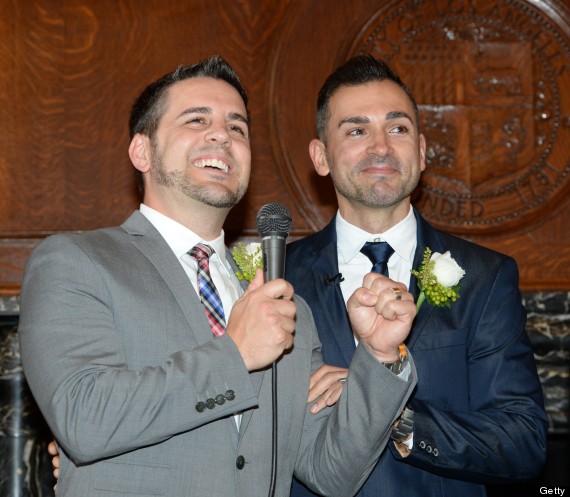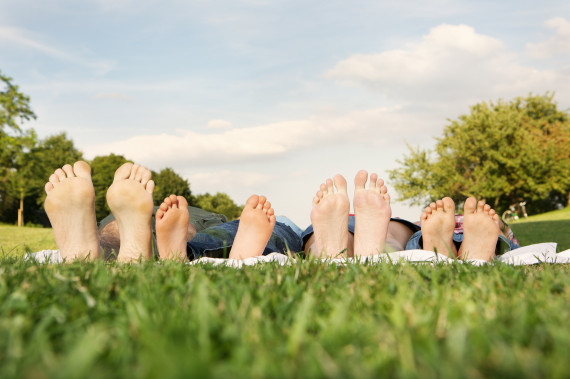We're living longer than ever: The average American born in 2013 will be alive nearly four years longer than someone born 20 years ago. But until recently, it wasn't clear if the years we've added to our lives were good-quality years.
A recent study from the University of Massachusetts Medical School starts to answer that question. Researchers found that today, 25 year olds can expect to live "2.4 more years of a healthy life" and 65 year olds can look forward to 1.7 extra healthy years than people who lived two decades back.
However, those extra years are far from guaranteed. Childhood obesity and its associated diseases threaten to reverse the upward tick of American life expectancy, which is currently calculated by the Centers for Disease Control and Prevention (CDC) to be just shy of 79 years.
Much of making it to your 100th birthday is beyond your control, as longevity is partly dictated by genetics and the medical history and health habits of your parents and grandparents. But there are also a handful (okay, a lot) of lifespan-enhancing practices that you can adopt today -- like taking your allotted vacation days, eating more leafy greens and getting enough sleep.
We scoured the research and sought advice from centenarians themselves. And while not all of these life-expanders are doable for everyone ("Be born in Japan," for example!), there is so much you can do to improve your odds of a long and healthful old age.
Find out what you're already doing right and where you can still improve in our list of100 ways to live to 100.
1. Be conscientious.
In the book The Longevity Project, authors Howard S. Friedman and Leslie R. Martin shared that in their research, being conscientious was one of the best predictors of longevity. That's because people who are conscientious may be more likely to abide by healthful behaviors, may be less prone to disease and may find more success in relationships and in the workplace.
2. Find reasons to laugh.
In a 2012 study published in the journal Aging, researchers from the Albert Einstein College of Medicine and Yeshiva University identified certain personality characteristics that a group of 243 centenarians had in common. Among them? A love of laughter. “They considered laughter an important part of life,” the lead researcher said.
3. Find a life purpose.
In the centenarian hotspot of Nicoya, Costa Rica, residents cultivate a plan de vida,which means “reason to live,” according to the website Blue Zones. “This sense of purpose often centers around spending time with and providing for their family,” the site says. “This often results in centenarians retaining an active lifestyle, reaping the benefits of physical activity and exposure to the sun.” According to Blue Zones, a 60-year-old Costa-Rican man has roughly twice the chance of living to 90 as a man living in the United States.
4. Go nuts.
Eating nuts could keep you from dying early, according to a study in BioMed Central. The study, based on data from 7,000 people ages 55 to 90, showed that nut-eaters -- who in the study were more likely to have a lower body mass index and waist circumference -- had a 39 percent lower risk of early death, and walnut-eaters in particular had a 45 percent lower risk of early death.
5. Walk a lot.

The 123-year-old Carmelo Flores Laura, potentially the oldest living person documented, says he owes his longevity to regular exercise. "I walk a lot, that's all. I go out with the animals," Flores told the Associated Press.
6. Try a little retail therapy.
Who doesn't love an excuse to go shopping?! A 2011 study found that frequent shoppers live longer. The study examined Taiwanese men and women over 65 and found that daily shopping lowered risk of death by 28 percent for men and 23 percent of women, AARP reported. And if you're worried about the state of your wallet, you're in luck: The benefits hold up even if you don't buy anything, WebMD reported.
7. Be happy.
A 2011 study published in the journal Proceedings of the National Academy of Sciences found that among older people, the group that scored as “happiest” (having the highest “positive affect”) had a death rate of 3.6 percent -- less than half the death rate of the unhappiest group, which was 7.3 percent.
8. Win an Oscar.
Researchers from Toronto's Sunnybrook and Women's College Health Sciences Centre found that Oscar-winning actors and directors tend to live longer than their losing peers, with winning actors and actresses living nearly four years more than their losing peers.
9. Head for the hills.

You may hear more often about the perils of altitude sickness, but it turns out that heading to new heights may be a good move. A 2011 study from the University of Colorado School of Medicine found that the 20 U.S. counties with the highest life expectancy had an average altitude of 5,967 feet above sea level. That added 1.2 to 3.6 years to a man's life, and six months to 2.5 years to a woman's and lowered all residents' risk of dying from heart disease, the researchers found.
10. Do unto others.
Susannah Mushatt Jones is the oldest resident of New York state -- she celebrated her 114th birthday this past summer. What's her secret? According to her niece in an interview with PIX11 news, treating everybody fairly is one of her "standards," along with taking care of others. The only medication she takes is for high blood pressure, and her diet consists of ribs, chicken, fruits and veggies, according to the PIX11 video segment.
11. But don’t forget about yourself.
Fitness guru Jack LaLanne, who passed away at the age of 96 in 2011, knew the importance of looking after yourself. “This is where I take care of the most important person in my life: me,” he joked of the gym in the documentary How To Live Forever. “Exercise is king. Nutrition is queen. Put them together and you’ve got a kindom.”
LaLanne repeated his message often. Esquire.com also quoted him as saying: “You’ve got to satisfy you. If you can’t satisfy you, you’re a failure.”
12. Put down the takeout menu.

Here’s a reason to get cooking: A 2012 study published in Public Health Nutrition found that people who cook at home up to five times a week were 47 percent more likely to still be alive after a decade, HuffPost previously reported. The researchers looked at 1,888 men and women over the age of 65 who lived in Taiwan.
13. Practice yoga.
There are some exceptional benefits to hitting the mat, including stress and anxiety relief, better balance and and increased flexibility. Just ask yoga instructor Tao Porchon-Lynch, who, at 95-years-old, credits the practice for her long, healthy, happy life.
14. Be optimistic.
The same 2012 Aging study that pointed to enjoying laughter as a possible factor in longevity also found that optimism was a personality trait linked to longer lifespans.
“When I started working with centenarians, I thought we'd find that they survived so long in part because they were mean and ornery," study author Nir Barzilai, M.D., of the Albert Einstein College of Medicine, said in a statement when the findings were released. "But when we assessed the personalities of these 243 centenarians, we found qualities that clearly reflect a positive attitude towards life. Most were outgoing, optimistic and easygoing."
15. But maybe not overly optimistic.
Elderly people may not want to view everything through rose-colored glasses: A new study shows that older people who overestimate their future happiness have a higher risk of death and disability, compared with people who underestimate or accurately predict future life satisfaction.
"Pessimism about the future may encourage people to live more carefully, taking health and safety precautions," study researcher Frieder Lang, a professor at the University of Erlangen-Nuremberg in Germany, said in a statement.
16. Go meatless.
Vegetarians may have a 12 percent lower risk of premature death than their meat-eating peers, according to a JAMA Internal Medicine study published earlier this year. The study included 73,308 Seventh-Day Adventist men and women who do not eat meat for religious reasons.
17. Put a ring on it.
Permanently-partnered Baby Boomers are less likely to die early than their single peers, according to a Duke University Medical Center study. The findings were based on 4,800 people born in the 1940s.
18. And while you’re at it, marry someone younger.
In July, 100-year-old Daisy Dunnett told SWNS.com that one key to her centenarian status might be her husband -- who's 33 years younger. The two met when she was 72, after her first husband died following 50 years of marriage, and he was 39. "I really think I would be dead if it was not for him," she said to SWNS.com. "If you’re elderly and on your own it is easy to give up and not feed yourself properly."
19. Or marry someone of the same sex.

According to a Danish study, gay men who are married have a lower mortality rate than single or divorced straight men. The study, published in the International Journal of Epidemiology, looked at the mortality rate among gay men in Denmark after it implemented a same-sex partnership law in 1989.
20. Try to keep your marriage friction-free.
A relationship full of turmoil and arguments could have an impact on how long you live. Brigham Young University researchers found in their study of 1,700 married adults that the more arguing there was in the relationship, the worse the adults' health.
21. But get divorced if it isn’t working.
While a happy marriage is a good indicator of future health and longevity, all is not lost for the happily divorced -- at least among women.
“Women who got divorced, often leaving a bad marriage, tended to thrive, as did single women! In fact, even widowed women often did unexpectedly well,” Friedman of The Longevity Project told TIME while reviewing his research findings. “Why? Women were able to rely on other friends, whereas many men depended on their wives for their social networks and so were devastated when they lost these ties.”
And that’s advice anyone can follow: Take control of your own socializing and reach out, especially if you’ve lost a spouse.
22. Brush those pearly whites.
Poor oral hygiene has been associated with shortened life expectancy. Maintaining a healthy mouth by habitually brushing and flossing can lower risks for heart disease, dementia and stroke.
23. Enjoy a cup of (Greek) joe.
A daily cup of antioxidant- and polyphenol-rich Greek coffee could be the secret to living long, according to a study in the journal Vascular Medicine. Researchers from the University of Athens Medical School conducted their study on 71 men and 71 women who live on the Greek island of Ikaria -- an island where residents tend to live to age 90 or more -- and found that those who drink boiled Greek coffee on a daily basis had better endothelial functioning than those who drank other kinds of coffee.
24. Put the pedal to the metal.

Like with walking briskly (also on the list), the pace at which you pedal your bike might predict how long you'll live. In a 2011 study of Copenhagen cyclists, men who pedaled fastest lived about five years longer than men who pedaled slowest. The fastest female cyclists averaged about four extra years. Among both genders, average cyclists lived somewhat longer than the slow pokes, proving the point that physical activity is good, but vigorous activity is even better.
25. Or be a super cyclist.
A recent study presented at the European Society of Cardiology Congress 2013 showed that French cyclists in the Tour de France tend to live longer than their non-cycling peers. The study included data from 786 French cyclists who participated in the race at least once between 1947 and 2012. They compared their health and causes of death with other French men in the same age range who did not participate in the Tour de France. Researchers found that their mortality rate was 41 percent lower, compared with the non-cyclists. "In the context of recent concerns regarding performance-enhancing techniques and the potential negative health effects of excessive high-level physical activity, data on the long-term outcomes and causes of death in elite endurance cyclists is of particular interest," study researcher Xavier Jouven, M.D., Ph.D., from the Sudden Death Expertise Center in Paris, France, said in a statement.
26. Get your Mediterranean diet on.
Elderly people who eat a Mediterranean diet -- rich in healthy fats (like olive oil), fish and produce -- may have an increased lifespan, compared with their peers who don't abide by the diet. The study, published in the journal AGE in 201, showed that the chances of living longer increased 20 percent from eating a Mediterranean diet.
27. Stop smoking.
As if you needed another reason to quit the habit, research shows that giving up cigarettes could help women live 10 years longer than if they had continued smoking. The study, published in the journal The Lancet, included 1.3 million women whose health habits were analyzed between 1996 and 2001.
28. Eat your fiber.
Consuming lots of fiber -- especially fiber from grains -- could help stave off early death from heart disease, infections and respiratory illness in men and women, as well as the risk of death from cancer for men, according to a huge study published in 2011 in the Archives of Internal Medicine. That research showed that people who met dietary guidelines on fiber -- 25 grams per day for women, and 38 grams per day for men -- had a lower risk of dying over a nine-year period.
29. Have a family.

Becoming a parent could help you live longer by decreasing your risk of conditions such as cancer and heart disease. However, the study, published in the journal Science & Medicine in 2010, showed that this health benefit only seemed to extend to people who had just two children.
30. But wait a few years to get started.
While it might be harder for them to get pregnant, women who have children in their 40s seem to be more likely to live to 100 than women who have children earlier in life, according to a 1997 study. It won't be physically possible for all women -- and that's the point. If a woman has not yet entered menopause in her 40s, she likely has theanti-aging genes required to make it to that 100th birthday, the Independent reported.
31. Hope for a daughter. (If you’re a dad!)
Daddy's girl? You're doing Dear Old Dad a favor. According to a 2006 study of a rural Polish population, having daughters may increase the lifespan of fathers. In fact, for every daughter born, the dads studied lived about 74 weeks longer.
32. Hope for twins. (If you're a mom!)
Those who deliver a set of twins may enjoy a longer lifespan, according to a report released in Proceedings of the Royal Society B.
The results surprised researchers, LiveScience reported: “rather than being a reproductive accident that drains mom of energy and nutrients, twins could be an evolutionary adaption in which healthy moms take the chance to pass on double their genes at once.”
One caveat: The study was a review of accounts of childbirth in 19th century Utah, so these twin births were natural and not the result of IVF -- a common factor in multiple births in modern day.
33. Stay in school.
People who stay in school for at least 12 years have more years of life ahead of them than those who don’t complete high school, according to a Harvard University study published in 2008. The research, which appeared in the journal Health Affairs, involved analysis of data from the National Longitudinal Mortality Study.
34. Make healthy changes in your life (starting today).
Adjusting your daily habits so that you eat whole foods, exercise, meditate and lean on your support system might potentially reverse cell aging. A recent study in the journal Lancet Oncology showed that making these healthy changes to your life is associated with longer telomeres, which are the "caps" at the ends of chromosomes; shorter telomeres have been linked in past research to cell aging, as well as higher risks of age-related diseases. While the study didn't show that healthy lifestyle changes can actually make you age backward, we'll take any news we can get that positive lifestyle choices actually pay off for our bodies.
